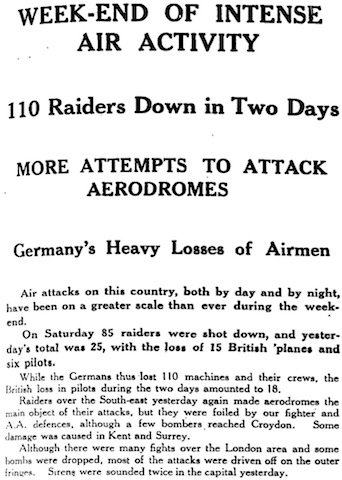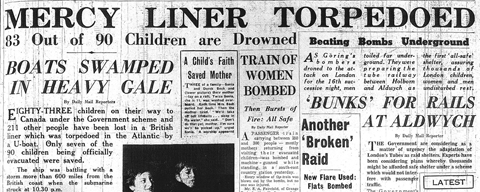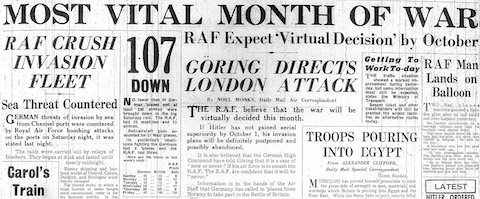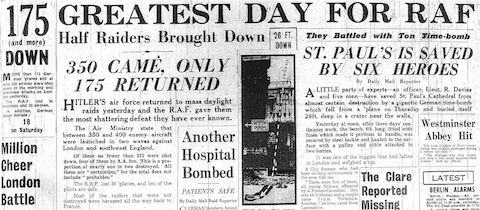
The Manchester Guardian sums up the weekend’s raids above (5). Eighty-five enemy aircraft were shot down on Saturday, and another twenty-five yesterday. British losses on those days were thirty-seven and fifteen, respectively. The headlines make for reassuring reading: ‘Raiders baffled in attacks on aerodromes’, ‘Raiders scattered on way to London’, ‘Nazis lose 700 airmen in a week’. And ‘More bombs on Berlin’. On behalf of the War Cabinet, Churchill has written a letter to the Commander-in-Chief of Bomber Command to congratulate his force on its work in bombing Germany and Italy. He made special mention of the fact that on the first raids on Berlin, ‘the great majority of pilots brought their bombs home, rather than loose them under weather conditions which made it difficult to hit the precise military objectives in their orders’.
This is in marked contrast with the wanton cruelty exhibited by the German flyers who, for example, have vented their spite upon the defenceless watering place and town of Ramsgate in which nearly a thousand dwellings and shops, mostly of a modest character, have been wrecked.
Churchill thinks the accurate marksmanship of Bomber Command is a sign that the ‘command of the air’ is slowly being ‘wrested from the Nazi criminals who hoped by this means to terrorise and dominate European civilisation’.
An article on page 6 discusses the combat debut of the RAF’s second Polish squadron, last Friday, during an ‘”exercise” flight’. One flight of its Hurricanes were practicing escorting Blenheims north of London when they spotted ‘”a very large enemy force’ 7,000 feet above them’. A Dornier broke formation and dived. One of the Polish pilots intercepted it and opened fire, while the others kept watch over the Blenheims. Result: one Do 17 destroyed, one very happy Polish airman.
On the same page, E. A. Montague reports on the construction of anti-invasion defences on ‘the Southern Coast’:
Barbed wire and guns and pillboxes look odd on the shores, where there are still a certain number of children paddling and girls strolling about in gorgeous bathing dresses.
Montague is very impressed by how well camouflaged the defences are. This is an an art ‘which has been brough by our Army in the last two months to a point probably higher than has ever been reached by any army before’. He was shown around an area defended by the Durham Light Infantry:
Walking along the beach and looking inland, I was told again and again “There is a Bren gun post” or “There is a company headquarters” and could not tell where they were, even with field-glasses.
He was also shown a new and ‘particularly deadly form of defence against tanks’ which is already ‘common round our coasts’. No clues are given as to what this weapon is, but the implication is that the German army may soon become intimately familiar with it…
An ‘authoritative comment’ is published on page 3, rebutting a German story that ‘an R.A.F. woman pilot has been washed ashore on the coast of Schleswig-Holstein’. This ‘claim is manifestly ridiculous’:
“The woman’s body cannot have been been that of a pilot, for the only women allowed to fly in Britain to-day are a band of twenty members of the Aircraft [sic] Transport Auxiliary, only one of whom has so far been killed, and whose death occurred in an accident which took place on land, not on sea. This A.T.A. is in any case, a civilian organisation. The only women enrolled in the British Air Forces are the well-known W.A.A.F.s, who serve as ground and clerical staff.”
I wonder why whichever authority said this was at such pains to deny that British women are flying for the RAF.
![]() This work is licensed under a Creative Commons Attribution-NonCommercial-NoDerivatives 4.0 International License.
Permissions beyond the scope of this license may be available at http://airminded.org/copyright/.
This work is licensed under a Creative Commons Attribution-NonCommercial-NoDerivatives 4.0 International License.
Permissions beyond the scope of this license may be available at http://airminded.org/copyright/.




“I wonder why whichever authority said this was at such pains to deny that British women are flying for the RAF.”
Perhaps because it would give an impression of desperation that would be bad for civilian morale?
You’re probably right, though a dignified silence probably would have served just as well! As we all know women were being drawn into previously male roles, even in the military. I think that, in addition to the need to rebut enemy propaganda, there’s some policing of gender boundaries going on here: women will go so far into the warzone and no further, so don’t worry about your manhood, chaps.